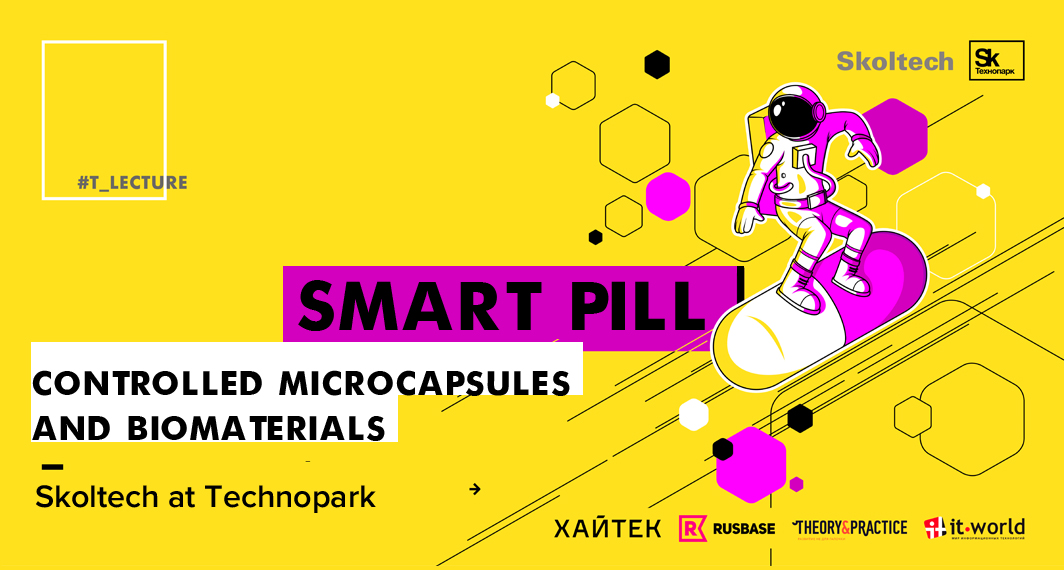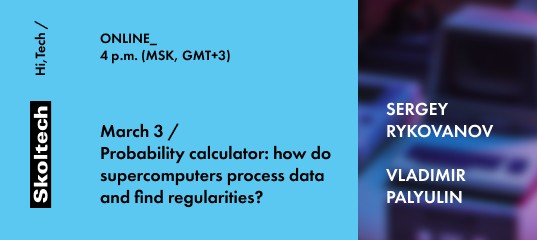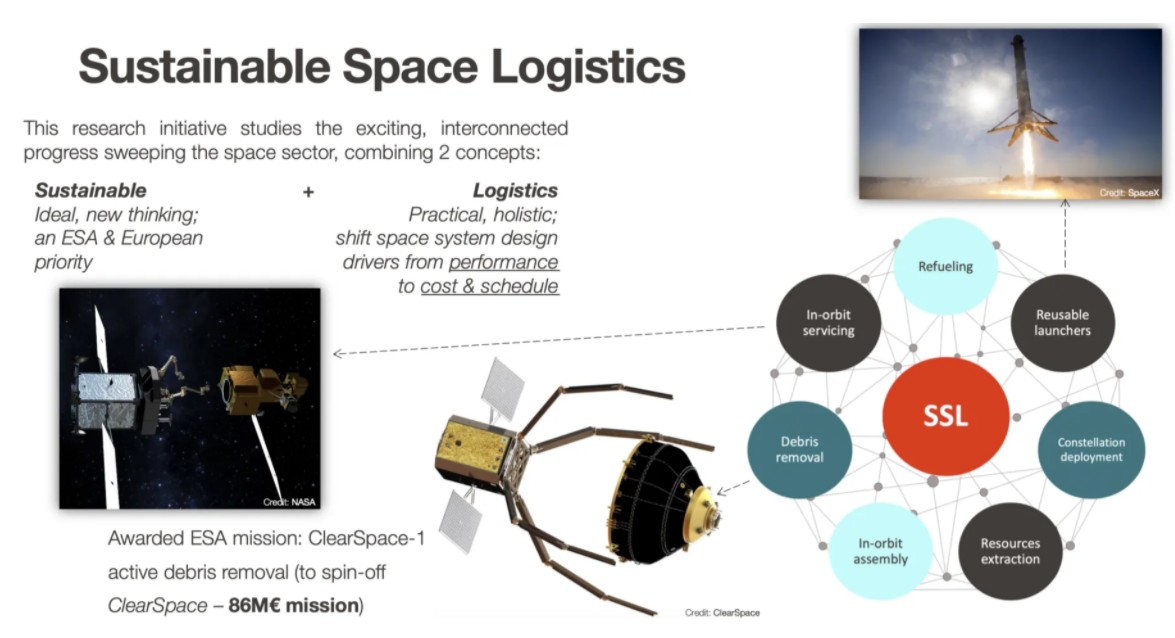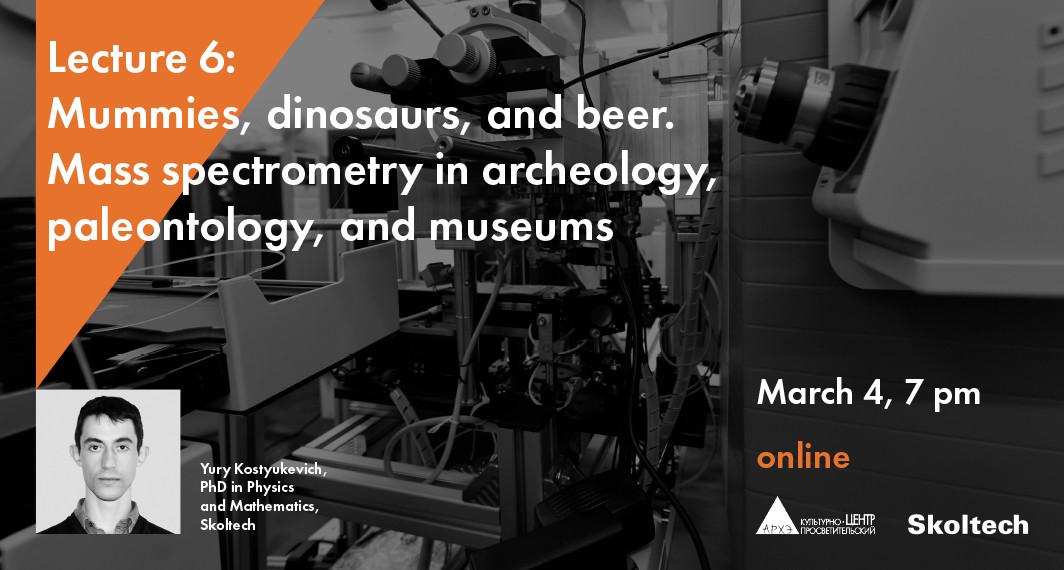-
Category Archives: Seminars
PhD Thesis Defense. Aliya Mukhametdinova
-
Skoltech at Technopark: “Smart pill: controlled microcapsules and biomaterials”
Skoltech at Technopark is a joint science education project of the Skolkovo Institute of Science and Technology (Skoltech) and the Skolkovo Technopark. Its lectures focus on the world-changing science, technology, innovation, and business topics presented by Skoltech faculty and researchers at the country’s best Technopark. (Lanugage: Russian)
Have you ever heard about targeted delivery of drugs to an affected area in the human body, or biomaterials with remote-controlled properties? Professor Gleb Sukhorukov will present the latest developments in the field.
Nowadays, composite materials have become a fixture in industries, with the global composites market expected to reach $ 115 billion by next year. Modern technology enables creating composites with desired properties and building structures that respond to external stimuli, such as ultrasound, a magnetic field or EM radiation of various frequencies.
Right now, micro- and nanostructured biomaterials, such as microcapsules for controlled release of drugs, constitute one of the main trends.
However, current limitations in the use of biomaterials in the human body prevent the wide spread of “controlled drugs”. The materials composition and the desired response to physical and chemical stimuli must comply with regulations as well as biocompatibility and minimal-toxicity requirements. Join the lecture to find out how scientists deal with these issues and create “smart” drugs.
Gleb Sukhorukov is a professor at Skoltech where he directs the Biomaterials Laboratory. Professor Sukhorukov leads biopolymers research at the School of Engineering and Materials Science, Queen Mary University of London. Ranked by the Forbes magazine among top 10 world-renowned scholars of Russian origin, Gleb Sukhorukov has authored upwards of 300 papers with over 30,000 citations.
Space Journey 2021
We are pleased to announce the registration for Space Journey 2021, an annual offline popular science city quest.
The Space Journey players look for a location – a cultural, historical, scientific or engineering landmark – within a designated city area, and once there, complete a thematic assignment focusing on science or space. The players step into the shoes of an astronomer, design satellite mock-ups, manipulate space robots, and predict solar activity. The team should cover as many locations as possible and reach the finishing point in time for the wrap-up and award ceremony. The total duration of the quest is 6 hours.
In 2021, the Year of Science and Technology in Russia, the quest is about Science and Space, with itineraries covering Moscow’s famous science districts and landmarks, such as Moscow State University, Lomonosovsky, Akademichesky, Gagarinsky, Cheryomushki, Khamovniki, and Obruchevsky, as well as major museums, monuments, and research centers.
We invite school and university student teams, families and corporate teams. Each category will compete in its own league. During the game, the teams will walk or use public transport.
Organizers: ANO Space Flight with the support of Roscosmos and Skoltech.
Grant support: The Mayor of Moscow (“Dushevnaya Moskva” competition).
Partners: Mosrazvitie, Architecture, Design and Reengineering College No. 26, Otkrytiy Kosmos Community, the Museum of Cosmonautics, Obrazovaniye Budushchego, Urania astronomical community, and Nedetskiye Initsiativy public youth association.
Participation is free.
Registration is open
For more details, check out and https://vk.com/kosmicheskyireis.
Instagram@kosmicheskyireis
Contact: WhatsApp, TG – 89194104042, Anastasia Ilyina.
Telegram Open / Data Science
-
Probability calculator: how do supercomputers process data and find regularities?
The Hi Tech project presents an online lecture:
The lecture is in Russian!
How does modern science predict randomness? How does parallel computing works? What is the role of the engineer, and what are the types of randomness? Join our online lecture on March 3 to find out the answers. Skoltech Professor Vladimir Palyulin will talk about the state of the art in numerical modeling and Skoltech Professor Sergey Rykovanov will discuss supercomputing exemplified by specific use cases.
Sign up for the lecture to learn more about:
- types and effects of randomness on the creation and study of models of natural phenomena and numerical methods;
- the most efficient numerical modeling methods, ranging from generation of random values and distributions to probability thinking;
- ways to calculate a supercomputer’s efficiency and identify a limit to capacity build-up.
The lecture will offer details about world-class MSc and postgraduate offerings at Skoltech which was listed among Nature Index’s top 100 young universities in 2019. Our students take internships at MIT, Harvard, the University of Calgary, and other top universities and labs. A voluntary medical insurance package (DMS) and draft deferment are provided if required.
Make sure to register for the event to access the free live broadcast!
On-orbit servicing, Debris & Proximity operations Workshop
The EPFL Space Center (eSpace) and Skoltech Space Center are co-organizing this On-orbit Servicing, Debris & Proximity Operations Workshop. It will gather international perspectives from industry, government, and academia interested in sustainable space logistics, to share their ideas and future visions of the field. One impact of new logistics in space is orbits have become more crowded. On-orbit servicing, space debris, life extensions and disposal are all deeply connected to this trend.
State-of-the-Art Mass Spectrometry: “Mummies, dinosaurs, and beer. Mass spectrometry in archeology, paleontology, and museums”
Skoltech Lecture Hub at ARHE presents a new online course of lectures: State-of-the-Art Mass Spectrometry
The mass spectrometer is a research instrument that ranks among the world’s greatest inventions. Mass spectrometry that helps weigh an individual molecule’s weight has become a fixture in doping research, medicine, ecology, and even museums.
What are the ingredients of ancient oil, dyes and embalming fluids for Egyptian mummies? Can molecular analysis help retrace ancient trade routes?
Can molecular analysis help find out more about dinosaurs and identify the purpose, age and geography of archaeological artifacts?
Join Yury Kostyukevich’s lecture to get the answers and find out how to brew beer according to an ancient Egyptian recipe, tell a fake from an original piece of art, and restore an art object.
Speaker: Yury Kostyukevich, PhD in Physics and Mathematics and Assistant Professor at the Skoltech Center for Computational and Data-Intensive Science and Engineering (CDISE).



